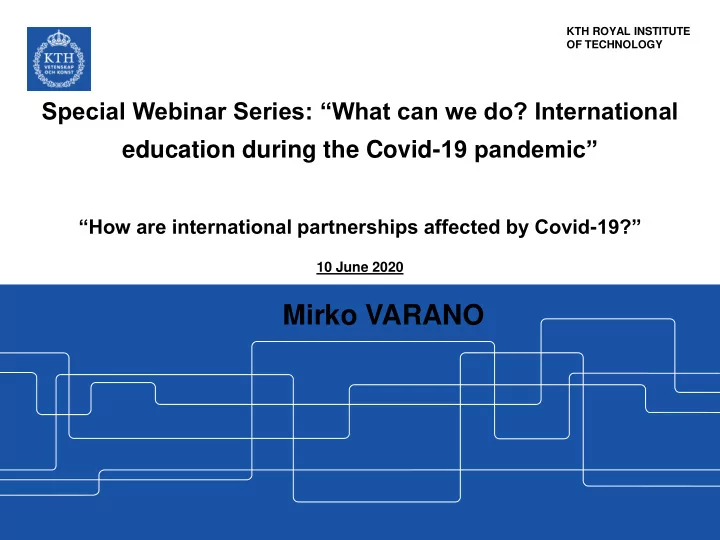

KTH ROYAL INSTITUTE OF TECHNOLOGY Special Webinar Series: “What can we do? International education during the Covid- 19 pandemic” “How are international partnerships affected by Covid - 19?” 10 June 2020 Mirko VARANO
How are international partnerships affected by Covid-19? ✓ What is affected and how? ✓ Current debate on opportunities and risks ✓ Possible future scenarios
Partnerships? ➢ Bilateral partnerships ➢ Multilateral partnerships and regional networks ➢ European University Networks ➢ Project based partnerships ➢ Global networks & International Associations
Status and current debate in the EU ❑ New Erasmus+ under negotiation ❑ Impact on the initial phaase of the EUN activities ❑ A new momentum for Internationalization at Home but … ❑ Virtual mobility high on the agenda but still misunderstood ❑ Inclusiveness?
Status and current debate in the EU ❑ Partnerships in different fields are affected differently ❑ Recruitment is heavily affected ❑ Management issues ❑ From emergency response to planning
What are the opportunities? ❑ More importance to needs analysis ❑ End of the mobility dominance? ❑ Internationalization of the curriculum based on international partnerships ❑ Partnerships for profit might benefit of the new situation ❑ More transnational education ❑ Better acceptance of globalization
What are the risks? ❑ The strong gets stronger but the weak gets weaker ❑ Some partners might be left behind ❑ Increased entropy ❑ Lower attractiveness of EHEA ❑ Capacity building and cooperation for development? ❑ Urge to start all over again without solutions
Possible future scenario ✓ More blended mobility options ✓ More reversed mobility ✓ Micro summer schools and seminars ✓ Introduction of on-line internships ✓ More structured partnerships ✓ More near internationalization (over distant internationalization) ✓ More transnational education initiatives
Possible future scenario (cont.) ✓ More focus on European added value and European Dimension ✓ Resilience as relevant criterion for negotiation ✓ More JPs with embedded virtual mobility options ✓ Active citizenship more in focus ✓ More COIL partnerships ✓ Increased relevance of the EEA
Open letter by NA Directors to the European Commission The need for cooperation and mutual learning , as a tool, amongst others, for equipping people with the competencies needed for an economic recovery, and which requires further investing in education and training. The need to revitalise a European sense of belonging , with Erasmus+ by its very nature offering opportunities to connect people and organisations across Europe. The need to learn from new initiatives and experiments in education and training , by tapping into the potential of digitalisation, and adopting blended learning techniques and virtual cooperation models, without compromising on quality. The n eed to keep meeting face-to-face, while encouraging the further development of online education and training , while paying special attention to the safety and well-being of participants The need to make full use of the new openings in the Erasmus+ proposal, and particularly by the new provisions for wider inclusion and more flexibility The need to remain in touch with the rest of the world , while cautioning on the dangers of isolation, and with Erasmus+ offering many opportunities for cooperation on a global scale.
Impact of COVID-19 on credit-mobile students – ESN report FOR ALMOST TWO-THIRDS OF RESPONDENTS, THEIR MOBILITY EXPERIENCE CONTINUED (65%). FOR ABOUT A QUARTER THE EXCHANGES WERE CANCELLED, AND THE REMAINING 5% WERE UNSURE ABOUT WHAT WAS TO HAPPEN. INITIALLY, 41.8% DECIDED TO STAY IN THEIR HOST COUNTRY, WHILE 40% DECIDED TO RETURN HOME; 5.2% WERE UNDECIDED, AND 3.6% INDICATED THAT THEY WERE UNABLE TO RETURN HOME. LAST, 7.8% OF THE RESPONDENTS SAID THAT THEY WERE UNABLE TO START THEIR EXCHANGE. 37.5% OF THE STUDENTS EXPERIENCED AT LEAST ONE MAJOR PROBLEM RELATED TO THEIR EXCHANGE: MOST OFTEN LOSS OF TRANSPORTATION TO RETURN HOME, FOLLOWED BY PROBLEMS WITH ACCOMMODATION AND PROBLEMS WITH ACCESS TO BASIC NEEDS, SUCH AS FOOD AND SANITARY PRODUCTS. 24% OF ITALIAN STUDENTS AND 19% OF ASIAN STUDENTS EXPERIENCED DISCRIMINATION BASED ON THEIR NATIONALITIES, EITHER TO A GREAT EXTENT OR TO A VERY GREAT EXTENT. 7% OF THE STUDENTS REPORTED THAT THEY WILL NOT GET ANY GRANT AT ALL FOR THEIR STUDIES. 24% REPORTED THAT THEY WILL KEEP THE GRANT, PARTIALLY OR FULLY. THE MAJORITY OF STUDENTS SAID THEY DID NOT KNOW WHAT WILL HAPPEN TO THEIR GRANTS. HALF OF THE STUDENTS WHOSE MOBILITY CONTINUED HAVE MOVED TO ONLINE CLASSES . 34% OF THEM HAVE MOVED TO PARTIAL ONLINE OR PARTIALLY POSTPONED CLASSES. THREE-QUARTERS OF THE STUDENTS WHOSE MOBILITIES WERE CANCELLED GOT SUPPORT FROM THEIR HOME INSTITUTIONS, MOST OFTEN WITH COURSE SCHEDULES.
Contact: varano@kth.se
Recommend
More recommend